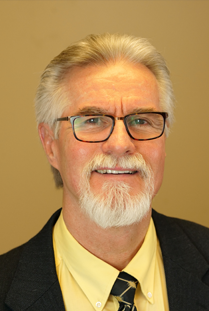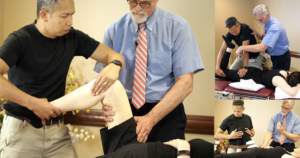Do you ever wonder why your older patients are not improving? Is there something you could do to make them better in a time efficient fashion? What about some great manual therapy interventions? Dr. Dennis Welling, an experienced and dually certified manual therapist, will show you some of the most efficient and effective manual techniques you can use quickly and effectively with older adults. He will briefly present the relevant studies with demonstrations and tons of time to practice and learn these simple, but effective techniques. Additionally, he will present the common mistakes and suggestions for proper execution of this important modality. You will leave feeling competent in adding many different manual techniques to your current rehabilitation program to get great results.
What Participants Are Saying . . .
The course information was very useful and applicable to my patient care.”
“I can incorporate what I learned immediately.”
“Excellent presentation!”
“Great interaction and detailed explanation!”
“Great teacher. Kept it interesting and energetic!”
“Dr. Welling was very patient and provided great feedback and tips.”
Upon completion of this seminar, participants
will be able to:
- Critique the skills needed to apply manual therapy techniques for the neck, back, hip, knee, foot, ankle, shoulder, and upper extremity by utilizing 50% of the course time to practice your skill set with oversight by your instructor.
- Demonstrate treatment techniques and how they can be modified for the older adult population.
- Describe hand/body placement and manual skills required for the delivery of mobilization/manipulation techniques.
- Explain the contraindications (RED FLAGS) and precautions for mobilization/manipulation for older adults.
- Progress manual therapy techniques for every part of the body.
- Document manual therapy techniques efficiently and effectively.
- Compare and contrast various manual techniques for lumbar stenosis, adhesive capsulitis, hip, and knee osteoarthritis, and many more.
EDUCATIONAL CREDIT: A certificate of attendance for 20 contact hours of educational activity (20 CEUs or 2.0 CEUs depending on how your Practice Act determines CEUs in your state) will be awarded to registrants upon completion of the seminar. Great Seminars and Books is an Approved CE Provider for PTs and PTAs in AR, OK, NY, IL, NC, CA, TX, NM, and KY and this course provides 20 contact hours of continuing education. This course is also approved for PTs and PTAs in LA, MS, MD, NJ, NE, and OK for 20 contact Hours. Have applied for approval for PTs/PTAs in SC, WI, UT, and NV. Our courses also meet the guidelines for approval in TN, PA, SD, MI, AL, VA, MO, IN, AZ, DE, GA, NH, OR, RI, UT, VT, WY and MO. Courses are accepted for CEUs in NE, ID, MT, WA, CT, IA, and ND. If you do not see your state listed, please give our office a call. This course is not approved by AOTA, ASHA, or Board of Certification.
Your tuition may be tax deductible. Any reference to or mention of state rules or regulations concerning continuing education requirements are true and accurate to the best of our knowledge at the time of print. If you have questions, please contact your board or regulating body.
If you do not see your state listed, please give our office a call at 877 794 7328.
DAY 1
7:30 AM – Registration and Continental Breakfast
8:00 AM – Introduction of Manipulation/Mobilization; Overview of evidence for effectiveness of manipulation/ mobilization; Indications and contraindication for Manual Therapy (Red Flags); Posture, Bautman (Journal of Rehab MED 2010) – Decreased Thoracic Kyphosis; Thoracic Extension Mobilization; Bautmans exercise for postural correction protocol
9:00 AM – Neck – Kinematics of the Cervical Spine (Mosby 2002) Forbush (JOSPT 2011)/Cleland (PTJ 2010) – Soft tissue mobilization of Cervical and Upper Thoracic; Occipital Release; manual Cervical traction; Deep pressure upper thoracic trapezius; Demonstrate Longus Colli muscle strengthening
9:45 AM – Break
10:00 AM – Back – Kinematics of Thoracolumbar Spine (Mosby 2002); Systematic review and meta-analysis Jacobi (2021 APMR); Lumbar Stenosis Whitman (2006 Spine); Effectiveness of Manual Therapy Zaworski (EJPRM 2021); Prone P/A mobilization of the hip; prone P/A thoracic mobs; prone P/A Thoracic Transverse processes PAIVM (two finger technique); side lying Lumbar rotation manipulation; supine/prone iliopsoas/rectus Femoris stretch; prone lumbosacral manual traction; prone lumbar rotation PIVM with raising the pelvis (pillow assist); prone lumbar lateral flexion PIVM; side lying lumbar spine soft tissue; Lumbar flexibility and core strengthening
12:00 PM – Working Lunch (on your own) – Lunch Assignment
1:00 PM – SI Joint – DonTigny (JORTHO 2005); DonTigny SI correction-45-degree Leg Pull; posterior mob–the pelvis direct method; SI self-correction mob; the easy fix
2:00 PM – Hip – Benell (PTJ 2011) Hoeksma (Arth&Rheum 2004) Beselga(Manual Therapy 2016); Hip long axis distraction with thrust; Hip lateral glide distraction with belt; Prone hip internal rotation mob; iliopsoas STM release; piriformis STM; MWM of hip IR and flexion with lateral glide with belt; Open to closed pack mob long axis distraction
3:15 PM – Break
3:30 PM – Knee – Deyle (Ann Int Med 2000, PTJ 2005, BMJ 2015, NEJM 2020); Knee extension with Valgus Small Amplitude (Grade IV) Mobs; Knee extension with Valgus Large Amplitude (Grade III) Mobs; Knee Extension with Varus Small Amplitude (Grade IV) Mobs; Knee Extension with Varus Large Amplitude (Grade III) Mobs; Knee Flexion with Internal Tibiofemoral Rotation Large Amplitude(Grade III); Small Amplitude (Grade IV) Knee Flexion with Wedge; Soft Tissue with Knee in Extension
5:00 PM – Case Studies and Problem Solving: Utilizing subjective and objective information provided for problem solving with an impairment-based evidence-based approach.
6:15 PM – Questions and Answers
6:30 PM – Adjourn
DAY 2
7:30 AM – Continental Breakfast
8:00 AM – Foot – Shamus (JOSPT 2007) Schuh (PTJ 2009) Cleland (JOSPT 2009); S/P Hallux Valgus Surgery Mobs of First MTP joint; Pronation of forefoot with Stabilized Calcaneus: Plantar Glide of Navicular on Talus/ Plantar Glide of Cuneiform on Navicular/Plantar Glide of First Metatarsal on Cuneiform; Plantar Heel Pain; Plantar Fascia and Flexor Hallucis longus tissue Mobilization; Rearfoot mobilization Lateral Glide; Rearfoot Distraction Manipulation; A/P of Talocrural joint; Distal Tibiofibular AA/P Mobs; Tibialis Posterior Stretch
10:00 AM – Break
10:15 AM – Shoulder – Jewel (PTJ 2009) Duenos (JOSPT 2019); Frozen Shoulder: Lateral GHJ Distraction with belt; Subscapularis STM; MWM in ER/IR with sustained A/P Glides; Inferior Glide Mobilization
Shoulder Pain – Bron (BMC 2011) Hines (J of Manip & Physiological Therapeutics 2010); Myofascial Trigger Point Release; Supraspinatus, Deltoid, Infraspinatus Muscles and Biceps Tendon
11:45 AM – Elbow – Bisset (BMJ 2006) Vincenzino (MT 2003) Kucuksen (APMR 2013); Lateral Epicondylitis; Sustained Lateral Glide with pain-free grip (SLGWPFG) for Elbow; SLGWPFG with treatment belt; Sustained Glide with Movement with Elbow Flexion; Sustained P/A Glide with Radiohumeral Joint with Pain-free Grip (SPAGWPFG); Muscle Energy Technique Supination/ Pronation of Forearm; McConnell Diamond Box Tape
12:45 PM – Working Lunch (on your own) – Group Discussion & Lunch Assignment
1:45 PM – Wrist – De Las Penas (PT 2020, EUR J Pain 2017, JP 2019); Carpal Tunnel Mobs: Longitudinal Stroke over Biceps Muscle; Transversal Stroke over Bicipital Aponeurosis; Dynamic Stroke of Pronator Teres Muscle; Stretching Transverse Carpal Ligament; Manual Compression of Lumbrical Muscles; Stretching of Palmar Aponeurosis; Median and Radial Nerve Glides
2:45 PM – Hand – Villafane (DIS and Rehab 2015, JOS 2013) Fields (J of Bodyworks 2007) OA Hand: Dorsal/Volar Glide with Distraction of First CMC Joint; STM for Upper Extremity for Hand OA
3:45 PM – Break
4:00 PM – Case Studies and Demonstration; Post Test
6:00 PM – Conclusion – Putting It All Together
6:30 PM – Adjourn
Cancellation/Refund Policy:
By Participants: Participant cancellations must be received in writing at least two weeks prior to the seminar date for tuition refund less a $75 administration fee. NO refunds will be made after this date.
By Great Seminars: In the event that a course is cancelled by Great Seminars and Books, participants will be offered the equivalent number of hours of another live course or a full refund. Great Seminars and Books is not responsible for course related expenses that participants may incur such as transportation including air fare, lodging or meals. It is highly recommended that you obtain refundable travel expenses.
For Mail/Email registrations call us at 877 794 7328 or fill out this registration form and email (greatseminars@aol.com) or mail (Great Seminars, 2639 Revere Drive, Akron, OH, 44333) it to us.
Registration Cost
Nashville, TN – September 20-21, 2025
Host: TriStar Centennial Medical Center
2300 Patterson St
Nashville, TN 37203
Early Bird (thru 8/6/25) = $545
Regular Price (8/7/25 – 8/27/25) = $595
Late Fee (8/28/24 – 9/20/25) = $645
Raleigh, NC – October 25-26, 2025
Host: WakeMed Health & Hospitals (Raleigh Campus)
Location: William F. Andrews Conference Center
3024 New Bern Avenue
Raleigh, NC 27610
Early Bird (thru 9/10/25) = $545
Regular Price (9/11/25 – 10/01/25) = $595
Late Fee (10/02/25 – 10/18/25) = $645
Your Instructor

|
Dr. Dennis Welling, PT, MTC, DPT, FSOAE |
|---|

